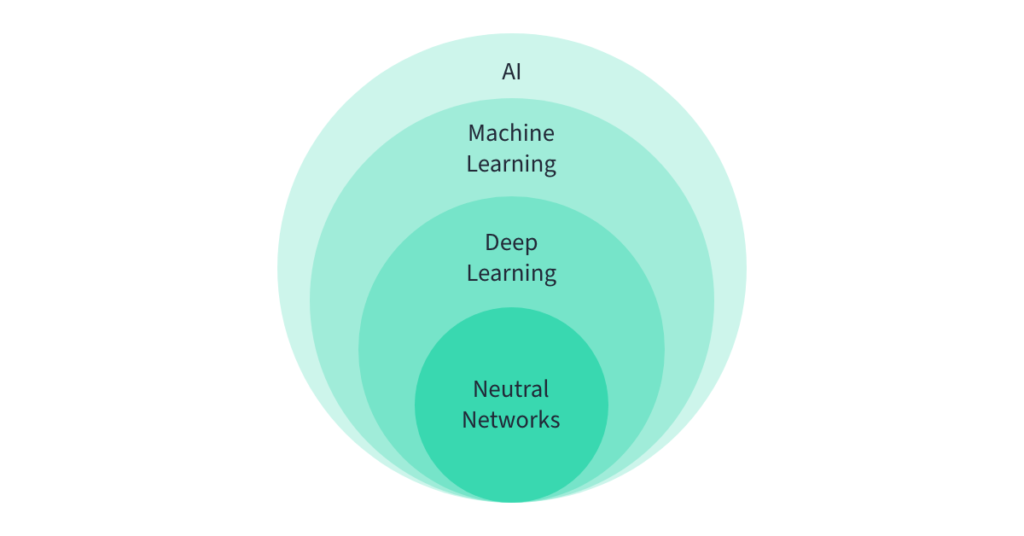Many professionals have been using the phrase “machine learning” in recent years. Quite rightly so, as it might revolutionize a lot of markets. Algorithms that can “learn” from data and get better at their tasks are the focus of this subfield of AI research and development. As a matter of fact, it significantly affected the healthcare system. In this article, we will explore the potential of machine learning in the HealthTech software development field.

State of Machine Learning in Healthcare
Machine Learning (ML) is a type of Artificial Intelligence (AI) that creates predictive algorithms for pattern recognition by training models on large datasets containing statistical data or images. Such algorithms can help with the classification and labeling of new data, offer recommendations based on given parameters, or even cluster similar data for improving future analysis. It can be used for the prediction of trends, detecting anomalies and outliers, highlighting relevant data, and implementing automated tasks based on input data.
Machine Learning can also be used as an assistance tool during the diagnostic process to help prevent medical error, improve patient outcomes, and quicken it by providing possible prognoses based on detected patterns indicative of diseases that may be difficult for humans to notice. Utilizing ML can help with collecting medical data and monitoring epidemics by handling the influx of large and complex datasets. It’s also very useful for personalizing treatments (accounting for drug interactions and risk factors in patient history) and early detection of diseases without consulting with a doctor which may lead to increased access to care, reducing the cost of healthcare, and offering help to patients and caregivers. Of course, it won’t be replacing professional diagnostics but could serve as a prophylactic tool to advise users.
The McKinsey Global Institute estimated that utilizing artificial intelligence methods such as big-data analysis and machine learning could generate up to 100 billion dollars annually across the US healthcare system by optimizing innovation, improving research efficiency, and developing tools for healthcare providers. Big companies such as Pfizer, Microsoft, KenSci, and others are already relying on Machine Learning to advance in the healthcare sector.

State of Machine Learning in software development
Incorporating machine learning techniques into software development presents some unique challenges.
When learning an entirely different set of skills required for ML systems, previous tools and practices might turn out to be inapplicable. Compared to software without AI, ML systems require additional preliminary experiments and predictable degradation in performance in the early stages of development. The design of ML software is more time-consuming and conducted in an intensively iterative way. Large testing datasets are necessary for testing which takes a lot of time to analyze and good results cannot guarantee the performance of ML systems in production. Data processing is the most important part of the development process and data availability limits the capability of ML systems.
A study conducted by the Singapore Management University identified several key skills necessary for developing ML software. That includes knowledge in math, information theory, and statistics. ML developers have a less defined roadmap for building systems when it comes to job complexity and problem-solving. It is also much harder to create an accurate plan for the development process. ML practitioners tend to communicate less frequently with clients.
Machine learning can be also utilized in many different areas of software development. It can improve coding efficiency by updating project code whenever the programming language updates. ML can help improve data storage by decreasing data storage space and quickly responding to running out of memory. It can help with testing, debugging, and detecting vulnerabilities in software. It’s suitable for automated data analysis. Machine learning can greatly improve cybersecurity to avoid unnecessary and delayed notifications or detect irregularities and breaches in security. ML provides software developers with ways to enhance the user experience by examining user behavior and patterns. Thanks to analyzing past projects it can compute precise estimations of the budget and time needed for new projects.

How machine learning impacts the HealthTech industry?
HealthTech software can greatly benefit from the advantages of machine learning. There are already multiple applications based on that technology to provide more accurate and faster solutions. It is mostly used in clinical technology but multiple applications of machine learning can help everyday users.
The Internet of Medical Things (wearables, sensor-enabled devices, and trackers) allow for real-time, remote patient monitoring. Such devices are often accompanied by dedicated applications that through machine learning analyze gathered data and help with drug management, improve health outcomes, enable remote medical assistance, ensure adherence to physician’s orders, detect patterns and irregularities in user’s behavior, and more. It also significantly increases patient engagement. An example of a company using such technology is Somatix.
Increased interest in mental health technology, caused by raised awareness, limited access to adequate care, and the ever-present stigma around it, lead to the creation of many new mental health platforms, bots, and apps. It was often a cheaper solution, easier to use and access, and it also allowed higher engagement. Such technologies often utilize machine learning to handle a massive influx of data to develop treatment plans, predict crises and react to users’ needs. Mental health help bots, such as Woebot, are powered by AI. Kintsugi Voice is an API-first platform that helps to identify mental health challenges using novel voice biomarkers in a speech in real-time. It can be integrated with call centers, telehealth systems, and remote patient monitoring apps.
Contact
Do you want to find out more about healthcare software development?
Developing HealthTech solutions based on machine learning
The potential for using machine learning in the HealthTech sector is unlimited. The adoption of these cutting-edge solutions is on the rise, and although it introduces specific challenges, ultimately, the needs of your healthcare software target audience take precedence. By analyzing patterns in user activity, machine learning, complemented by healthcare software development services, significantly empowers programmers to deliver enhanced services to their end customers. If you’re looking to explore or discuss your technology solutions, our healthcare software development services are here to offer the necessary support and expertise.

